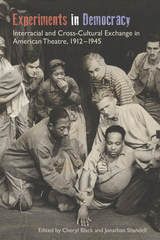
In Experiments in Democracy, edited by Cheryl Black and Jonathan Shandell, theatre historians examine a wide range of performances—from Broadway, folk plays and dance productions to scripted political rallies and radio dramas. Contributors look at such diverse groups as the Theatre Union, La Unión Martí-Maceo, and the American Negro Theatre, as well as individual playwrights and their works, including Theodore Browne’s folk opera Natural Man, Josefina Niggli’s Soldadera, and playwright Lynn Riggs’s Cherokee Night and Green Grow the Lilacs (the basis for the musical Oklahoma!). Exploring the ways progressive artists sought to connect isolated racial and cultural groups in pursuit of a more just and democratic society, contributors take into account the blind spots, compromised methods, and unacknowledged biases at play in their practices and strategies. Essays demonstrate how the gap between the ideal of American democracy and its practice—mired in entrenched systems of white privilege, economic inequality, and social prejudice—complicated the work of these artists.
Focusing on questions of race, ethnicity, gender, and sexuality on the stage in the decades preceding the Civil Rights era, Experiments in Democracy fills an important gap in our understanding of the history of the American stage—and sheds light on these still-relevant questions in contemporary American society.
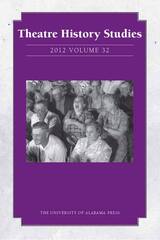
Penny Farfan / Victor Holtcamp / Lisa Jackson-Schebetta / Richard
L. Poole / Bill Rauch / Thomas Robson / Marlis Schweitzer / Virginia
Scott / Christine Woodworth
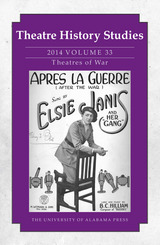
War and theatre is a subject of increasing popularity among scholars of theatre. The essays in this special edition of Theatre History Studies brings together a unique collection of work by thirteen innovative scholars whose work explores such topics as theatre performances during war times, theatre written and performed to resist war, and theatre that fosters and promotes war.
The contributors to this volume write poignantly about nationhood and about how war—through both propaganda and protest—defines a people. The contributors also delve into numerous fascinating themes that transcend time, peoples, nations, and particular conflicts: the foundations of nationalism and the concepts of occupied and occupier, nostalgia and utopia, and patriotism and revolution.
These essays survey a march of civil and international wars spanning three centuries. Arranged chronologically, they invite comparisons between themes and trace the development of the major themes of war. Ideas manifest in the theatre of one period recall ideologies and propaganda of the past, reflect those of the present, and anticipate wars to come.
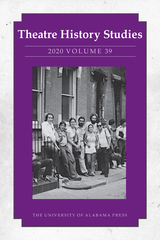
THEATRE HISTORY STUDIES, VOLUME 38
PART I: Studies in Theatre History
MATTHIEU CHAPMAN
Red, White, and Black: Shakespeare’s The Tempest and the Structuring of Racial Antagonisms in Early Modern England and the New World
MICHAEL CHEMERS AND MICHAEL SELL
Sokyokuchi: Toward a Theory, History, and Practice of Systemic Dramaturgy
JEFFREY ULLOM
The Value of Inaction: Unions, Labor Codes, and the Cleveland Play House
CHRYSTYNA DAIL
When for “Witches” We Read “Women”: Advocacy and Ageism in Nineteenth-Century Salem Witchcraft Plays
MICHAEL DENNIS
The Lost and Found Playwright: Donald Ogden Stewart and the Theatre of Socialist Commitment
Part II: HEMISPHERIC HISTORIOGRAPHIES
EMILY SAHAKIAN, CHRISTIANA MOLLDREM HARKULICH, AND LISA JACKSON-SCHEBETTA
Introduction to the Special Section
PATRICIA YBARRA
Gestures toward a Hemispheric Theatre History: A Work in Progress
ERIC MAYER- GARCÍA
Thinking East and West in Nuestra América: Retracing the Footprints of a Latinx Teatro Brigade in Revolutionary Cuba
ANA OLIVAREZ-LEVINSON AND ERIC MAYER-GARCÍA
Intercambio: A Visual History of Nuevo Teatro from the Ana Olivarez-Levinson Photography Collection
JESSICA N. PABÓN-COLÓN
Digital Diasporic Tactics for a Decolonized Future: Tweeting in the Wake of #HurricaneMaria
LEO CABRANES-GRANT
Performance, Cognition, and the Quest for an Affective Historiography
Part III: Essays from the Conference
The Robert A. Schanke Award-Winning Essay, from the 2019 Mid-America Theatre Conference
JULIE BURRELL
Reinventing Reconstruction and Scripting Civil Rights in Theodore Ward’s Our Lan’
The Robert A. Schanke Honorable Mention Essay, MATC 2019
MATTHEW MCMAHAN
Projections of Race at the Nouveau Cirque: The Clown Acts of Foottit and Chocolat
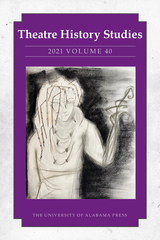
Introduction
—LISA JACKSON-SCHEBETTA, WITH ODAI JOHNSON, CHRYSTYNA DAIL, AND JONATHAN SHANDELL
PART I
STUDIES IN THEATRE HISTORY
Un-Reading Voltaire: The Ghost in the Cupboard of the House of Reason
—ODAI JOHNSON
Caricatured, Marginalized,
and Erased: African American Artists and Philadelphia’s Negro Unit of the FTP, 1936–1939
—JONATHAN SHANDELL
Stop Your Sobbing: White Fragility, Slippery Empathy, and Historical Consciousness in Branden Jacobs-Jenkins’s Appropriate
—SCOTT PROUDFIT
Asia and Alwin Nikolais: Interdisciplinarity, Orientalist Tendencies, and Midcentury American Dance
—ANGELA K. AHLGREN
PART II
WITCH CHARACTERS AND WITCHY PERFORMANCE
Editor’s Introduction to the Special Section
Shifting Shapes: Witch Characters and Witchy Performances
—CHRYSTYNA DAIL
To Wright the Witch: The Case of Joanna Baillie’s Witchcraft
—JANE BARNETTE
Nothing Wicked This Way Comes: Shakespeare’s Subversion of Archetypal Witches in The Winter’s Tale
—JESSICA HOLT
Of Women and Witches: Performing the Female Body in Caryl Churchill’s Vinegar Tom
—MAMATA SENGUPTA
(Un)Limited: The Influence of Mentorship and Father-Daughter Relationships on Elphaba’s Heroine Journey in Wicked
—REBECCA K. HAMMONDS
Immersive Witches: New York City under the Spell of Sleep No More and Then She Fell
—DAVID BISAHA
PART III
Essay from the Conference
The Robert A. Schanke Award-Winning Essay, MATC 2020
New Conventions for a New Generation: High School Musicals and Broadway in the 2010s
—LINDSEY MANTOAN
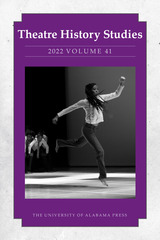
Theatre History Studies is the official journal of the Mid-America Theatre Conference, Inc. (MATC). The conference is dedicated to the growth and improvement of all forms of theatre throughout a twelve-state region that includes the states of Illinois, Iowa, Nebraska, Kansas, Missouri, Minnesota, North Dakota, South Dakota, and Wisconsin. Its purposes are to unite people and organizations within this region and elsewhere who have an interest in theatre and to promote the growth and development of all forms of theatre.
Published annually since 1981, Theatre History Studies provides critical, analytical, and descriptive essays on all aspects of theatre history and is devoted to disseminating the highest quality peer-review scholarship in the field.
CONTRIBUTORS
Angela K. Ahlgren / Samer Al-Saber / Kelly I. Aliano / Gordon Alley-Young / Melissa Blanco Borelli / Trevor Boffone / Jay Buchanan / Matthieu Chapman / Joanna Dee Das / Ryan J. Douglas / Victoria Fortuna / Christiana Molldrem Harkulich / Alani Hicks-Bartlett / Jeanmarie Higgins / Lisa Jackson-Schebetta / Erin Rachel Kaplan / Heather Kelley / Patrick Maley / Karin Maresh / Lisa Milner / Courtney Elkin Mohler / Heather S. Nathans / Heidi L. Nees / Sebastian Samur / Michael Schweikardt / Teresa Simone / Dennis Sloan / Guilia Taddeo / Kyle A. Thomas / Alex Vermillion / Bethany Wood

The official journal of the Mid-America Theatre Conference
Theatre History Studies (THS) is a peer-reviewed journal of theatre history and scholarship published annually since 1981 by the Mid-America Theatre Conference (MATC), a regional body devoted to theatre scholarship and practice. The conference encompasses the states of Illinois, Iowa, Nebraska, Kansas, Missouri, Minnesota, North Dakota, South Dakota, Wisconsin, Indiana, Michigan, and Ohio. The purpose of the conference is to unite persons and organizations within the region with an interest in theatre and to promote the growth and development of all forms of theatre. THS is a member of the Council of Editors of Learned Journals and is included in the MLA Directory of Periodicals. THS is indexed in Humanities Index, Humanities Abstracts, Book Review Index, MLA International Bibliography, International Bibliography of Theatre, Arts & Humanities Citation Index, IBZ International Bibliography of Periodical Literature, and IBR International Bibliography of Book Reviews. Full texts of essays appear in the databases of both Humanities Abstracts Full Text and SIRS.Along with book reviews on the latest publications from established and emerging voices in the field, this issue of Theatre History Studies contains three sections with fourteen essays total. In the general section, three essays offer an array of insights, methods, and provocations. In the special section on care, contributors capture their experience as scholars, humans, and citizens in 2022. In Part III, the 2022 Robert A. Schanke Research Award-winning paper by Heidi L. Nees asks historians to rethink Western constructions of time. Taken together, volume 42 captures how this journal serves theatre historians as scholars and laborers as they work to attend and tend to their field.
CONTRIBUTORS
Cheryl Black / Shelby Brewster / Matthieu Chapman / Meredith Conti / Zach Dailey / Michael DeWhatley / Whit Emerson / Katherine Gillen / Miles P. Grier / Patricia Herrera / Lisa Jackson-Schebetta / Nancy Jones / Joshua Kelly / Felicia Hardison Londré / Bret McCandless / Marci R. McMahon/ Tom Mitchell / Sherrice Mojgani / John Murillo III / Heidi L. Nees / Jessica N. Pabón-Colón / Kara Raphaeli / Leticia L. Ridley / Cynthia Running-Johnson / Alexandra Swanson / Catherine Peckinpaugh Vrtis / Shane Wood / Christine Woodworth / Robert O. Yates
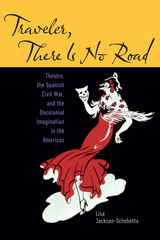
This book offers a unique perspective on 1930s theatre and performance, encompassing the theatrical work of the Cuban, Puerto Rican, and Spanish diasporas in the United States, as well as the better-known Anglophone communities. Jackson-Schebetta situates well-known figures, such as Langston Hughes and Clifford Odets, alongside lesser-known ones, such as Erasmo Vando, Franca de Armiño, and Manuel Aparicio. The milicianas, female soldiers of the Spanish Republic, stride on stage alongside the male fighters of the Lincoln Brigade. They and many others used the multiple visions of Spain forged during the civil war to foment decolonial practices across the pasts, presents, and futures of the Americas. Traveler conclusively demonstrates that theatre and performance scholars must position US performances within the Americas writ broadly, and in doing so they must recognize the centrality of the hemisphere’s longest-lived colonial power, Spain.
READERS
Browse our collection.
PUBLISHERS
See BiblioVault's publisher services.
STUDENT SERVICES
Files for college accessibility offices.
UChicago Accessibility Resources
home | accessibility | search | about | contact us
BiblioVault ® 2001 - 2024
The University of Chicago Press









